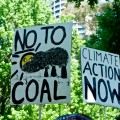Christiana Figueres’ Speech to the World Coal Association International Coal & Climate Summit: Full Transcript
Linh Do | November 18, 2013.
There has been much controversy surrounding Christiana Figueres’ speech to the World Coal Association International Coal & Climate Summit, covered by us here and here, that went ahead this morning.
A full transcript of her speech is below.
—
I appreciate the opportunity to address the International Coal and Climate Summit in a frank and honest exchange on the transition to a low-emission economy.
Let me be clear from the outset that my joining you today is neither a tacit approval of coal use, nor a call for the immediate disappearance of coal. But I am here to say that coal must change rapidly and dramatically for everyone’s sake.
There are some who, deeply concerned about the devastating effects of climate change already felt by vulnerable populations around the world, are calling for the immediate shut down of all coal plants.
There are others who think that coal does not have to change at all, that we can continue to extract and burn as we have done in the past.
The first view does not take into account the immediate needs of nations looking to provide reliable energy to rapidly growing populations in pursuit of economic development and poverty eradication.
The second view does not take into account the immediate need for climate stability on this planet, necessary for the wellbeing of present and future generations.
Today I want to set out an alternative path that is admittedly not easy, but is undoubtedly necessary. That path must acknowledge the past, consider the present and chart a path towards an acceptable future for all. I join you today to discuss this path for two reasons.
First, the energy sector is an intrinsic component of a sustainable future.
And second, the coal industry must change and you are decision makers who have the knowledge and power to change the way the world uses coal.
The path forward begins in the past, recognising that coal played a key role in the history of our economic development. From heating to transportation to the provision of electricity, coal has undoubtedly enabled much of our progress over the last 200 years.
Coal was at the heart of the developed world’s Industrial Revolution and brought affordable energy to the developing world. However, while society has benefitted from coal-fuelled development, we now know there is an unacceptably high cost to human and environmental health.
The science is clear. The IPCC Fifth Assessment Report outlines our predicament. We are at unprecedented GHG concentrations in the atmosphere; our carbon budget is half spent. If we continue to meet energy needs as we have in the past, we will overshoot the internationally agreed goal to limit warming to less than two degree Celsius.
AR5 is not science fiction, it is science fact.
AR5 is the overwhelming consensus of 200 lead authors synthesising the work of 600 scientists who analysed 9000 peer-reviewed publications. AR5 is arguably the most rigorous scientific report ever written. And, the findings of the AR5 have been endorsed by 195 governments, including all of those in which you operate.
There is no doubt that the science is a clarion call for the rapid transformation of the coal industry. Just this morning, more than 25 leading climate and energy scientists from around the world released a clear statement about the need to radically rethink coal’s place in our energy mix.
Considering that coal energy loads the atmosphere with greenhouse gasses, competes for water and impacts public health, the call of science has already been answered by a wide gamut of stakeholders:
Students, faith-based organisations and citizens are asking their investment managers to divest from coal and other fossil fuels. Cities choked by air pollution are limiting the burning of coal.
Development banks have stopped funding unabated coal. Commercial financial institutions are analysing the implications of unburnable carbon for their investment strategies. Pricing of GHG emissions is on the rise, evidenced by trading markets coming online around the globe. And, international policy is moving us toward a global low-emission economy.
All of this tells me that the coal industry faces a business continuation risk that you can no longer afford to ignore.
Like any other industry, you have a fiduciary responsibility to your workforce and your shareholders. Like any other industry, you are subject to the major political, economic and social shifts of our time. And by now it should be abundantly clear that further capital expenditures on coal can go ahead only if they are compatible with the two degree Celsius limit.
Ladies and gentlemen, the coal industry has the opportunity to be part of the worldwide climate solution by responding proactively to the current paradigm shift. It would be presumptuous of me to put forward a transition plan for coal as you are the repositories of knowledge and experience, and the assets you manage are at stake.
But there are some fundamental parameters of this transition:
- Close all existing subcritical plants;
- Implement safe CCUS on all new plants, even the most efficient; and
- Leave most existing reserves in the ground.
These are not marginal or trivial changes, these are transformations that go to the core of the coal industry, and many will say it simply cannot be done. But the phrase “where there’s a will, there’s a way” is tantamount to human history because will precedes innovation, and innovation precedes transformation. John F. Kennedy called for putting man on the moon in ten years at a point when no one knew how that would be done.
We must transform coal with the same determination, the same perseverance, the same will. We must be confident that if we set an ambitious course to low-emissions, science and technology will rapidly transform systems. Above all, you must invest in this potential, because the coal industry has the most to gain by leveraging the existing capital, knowledge and capacity to transform itself.
The world is rising to meet the climate challenge as risks of inaction mount, and it is in your best interest to make coal part of the solution. These radical changes have the transformative power to bring coal in line with the direction in which society is moving.
I urge every coal company to honestly assess the financial risks of business as usual; anticipate increasing regulation, growing finance restrictions and diminishing public acceptance; and leverage technology to reduce emissions across the entire coal value chain.
You are here today as coal industry leaders, but you can also understand yourselves as long-term energy supply leaders. Some major oil, gas and energy technology companies are already investing in renewables, and I urge those of you who have not yet started to join them.
By diversifying your portfolio beyond coal, you too can produce clean energy that reduces pollution, enhances public health, increases energy security and creates new jobs.
By diversifying beyond coal, you reduce the risk of stranded assets and make yourselves ready to reap the rewards of a green economy.
By diversifying beyond coal, you can deploy your disciplined, courageous and technically skilled workforce into new renewable energy jobs, transforming your companies from within.
The Warsaw Communique is a first step for change because it shows:
- That the Association accepts climate change as a development risk; and
- That lower coal emissions is an aspirational and realisable goal.
The communique is a first step, but it cannot be the last. I invite you to use this Climate and Coal Summit to decide how you are going to step up to the challenge of contributing to real climate change solutions.
We must urgently take the steps that put us on an ambitious path to global peaking by the end of this decade, and zero-net emissions by the second half of the century. Steps that look past next quarter’s bottom line and see next generation’s bottom line, and steps to figure health, security and sustainability into the bottom line.
For it will be your children and my children, our grandchildren and their grandchildren who will look back at today and judge our collective commitment to them.
They must be able to look back and recognise this summit as a historic turning point for the coal industry.
Thank you.
Transcript courtesy of the UNFCCC, photo by Laura Owsianka.












comment